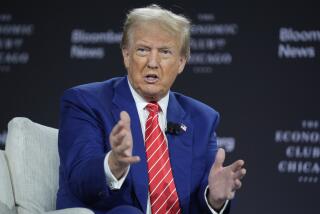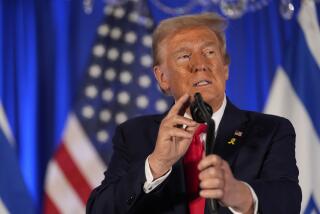Obama says he didnât underestimate Putin but did misjudge the potency of misinformation
Reporting from Washington â President Obama insisted in an interview that aired Sunday he did not underestimate Russian President Vladimir Putin when he dismissed Mitt Romneyâs 2012 campaign assessment that the country was the top U.S. geopolitical foe. But Obama acknowledged he may have misjudged Russiaâs ability to tamper in the American electoral process.
âI underestimated the degree to which, in this new information age, it is possible for misinformation, for cyberhacking and so forth, to have an impact on our open societies, our open systems, to insinuate themselves into our democratic practices in ways that I think are accelerating,â he said on ABCâs âThis Week.â
The comments in the taped interview came as debate over a joint intelligence report on Russiaâs effort to help President-elect Donald Trump in the 2016 election continued to rage. Trump and his aides have tried to downplay the reportâs findings and would not commit on Sunday to punishing Russia further for the activities than Obama has.
âThat is something that the president-elect, when he is sworn in in less than two weeks, Chuck, will have to decide along with his security and intelligence team,â Kellyanne Conway, who served as Trumpâs campaign manager, told Chuck Todd on NBCâs âMeet the Press.â
âI do think some people are scratching their heads as to why President Obama took action and punished Russia and Russian operatives before the report was completed, before others had the information.â
Obama announced a raft of punishments in late December, including sanctions and orders for a few dozen Russian intelligence operatives to leave the U.S., well after after U.S. investigators had concluded that Russia intended to meddle in the election.
Thousands of emails pilfered from the Democratic National Committee servers and from Hillary Clintonâs campaign chairman were posted on WikiLeaks and other websites through the summer and fall, undermining Clintonâs campaign.
Obama was given a report Thursday from the CIA, FBI and National Security Agency saying that Putin ordered agents to interfere in the election and ultimately sought to aid Trumpâs rise. The president-elect was shown the same report Friday, before a declassified version was made public.
In another interview on CNN, Conway referred to âalleged attacksâ from Russia, contradicting the conclusions from the U.S. intelligence community that the evidence of such attacks was clear. The report did not weigh in on whether those attacks succeeded, something that is difficult to gauge given the multitude of issues and controversies that arose during the election, the closeness of the election results and Clintonâs failure to connect with white working-class voters who swung the outcome.
Trump and his aides have pounced on the lack of definitive findings on whether the attacks affected the election outcome, even though Trump spoke frequently during the campaign about email leaks to WikiLeaks that have been linked to the Russians.
âWe didnât need WikiLeaks to convince the American people that they didnât like her, didnât trust her, didnât find her to be honest,â Conway said.
As Obama leaves office, the dispute is not likely to go away. Many in Trumpâs own party have called for continued investigation and retaliation against Russia.
Obamaâs defense secretary, Ashton Carter, said on Sunday that he agreed more was needed.
âThe steps that have been taken so far probably represent a beginning and not the end â a floor, not the ceiling,â Carter said on âMeet the Press.â âObviously, being up to the next administration and the next Congress to take those steps. But I suppose, I believe, there will be more, there probably should be more.â
Still, Carter did not call for a complete chill in relations with Russia. He noted that even in the Cold War, the two countries found common ground on some issues.
âWe do have to have what Iâll call a strong but also a balanced approach to Russia,â he said.
ALSO:
Donald Trump, citing Julian Assange, again mocks intelligence officialsâ case for Russian hacking
More to Read
Get the L.A. Times Politics newsletter
Deeply reported insights into legislation, politics and policy from Sacramento, Washington and beyond. In your inbox three times per week.
You may occasionally receive promotional content from the Los Angeles Times.











